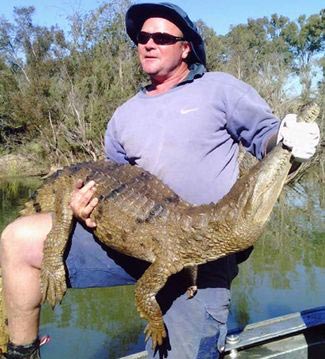Brave Fishery Officials Catch Freshwater Crocodile (Conservation Success for Rare Species)
Lungfish Survey Leads to Crocodile Capture
Fishery officers carrying out a survey of fish species in the Wide Bay-Burnett region of Queensland got a shock when the weir they were surveying turned out to be the home of a Freshwater crocodile. The quick thinking fishery officials were able to tape the animal’s long jaws closed and prevent themselves or indeed the crocodile, from being hurt.
Freshwater Crocodile
The close encounter with a crocodile took place at Mundubbera’s Jones Weir last week, whilst the fishery team were carrying out lungfish research. Mundubbera may be the confluence of three rivers, but Australian Freshwater crocodiles (Crocodylus johnsoni) are not known from this part of Queensland, indeed the nearest population of wild Freshwater crocodiles are to be found in most northerly parts of the State where it is much more humid and generally warmer throughout the year.
How the one-and-a -half-metre-long reptile got into the weir remains a mystery but staff from the Department of Agriculture, Fisheries and Forestry suspect that this male crocodile had been taken from the wild and kept illegally before getting too big and dangerous for the owner to cope with. The crocodile was most probably dumped at the weir location and may have been there for some time before the survey team came to their study and discovered what must be the weir’s most unexpected resident.
The fishery survey team were releasing electrical charges into the water to stun fish so that the population and diversity of the species could be logged. After one electric shock was delivered, the stunned reptile floated to the surface, much to the amazement of the research team.
Australian Freshwater crocodiles are to be found in Western Australia, the Northern Territory and the far north of Queensland. Much smaller than the other crocodile species that is indigenous to Australia, the Saltwater crocodile (Crocodylus porosus), this species only rarely attacks people, but the long, narrow jaws lined with sharp teeth are very capable of inflicting a severe injury should a crocodile be provoked into an attack.
Catch of the Day – The Mundubbera Crocodile
Picture credit: Dept. of Agriculture, Fisheries and Forestry
The weir is a popular fishing spot but the Mundubbera Anglers and Fish Stocking Association president Kyle Gleich stated that none of the local fisherman had reported anything unusual from the location. The crocodile has been checked over by veterinary staff and given a clean bill of health, despite living in much cooler conditions and being over six hundred miles away from its natural habitat.
The freshwater crocodile probably survived by feeding on fish, frogs and flying foxes. Commenting on the unusual discovery, Mike Devery, a wildlife manager at the Environment and Heritage Protection Department stated:
“It is likely the crocodile had been released there at some time. We have had a number of incidents where Freshwater crocodiles have been found that had probably been acquired as pets and then the owners decided they didn’t want it and let it go.”
The fishery staff surveying the watercourse deserve praise for their quick thinking, grabbing and securing the crocodile after it had been stunned before it could pose a threat to the research team. For this crocodile, being returned to the wild is not an option. He has been exposed to an environment that would be alien to wild populations, a transfer to the wild could mean the spread of disease. The future for this particular reptile is uncertain, Government officials are hoping that a zoo will take him in, otherwise he might end up at a commercial crocodile farm.
For replicas and models of crocodilians and extinct archosaurs: Models of Extinct Archosaurs and Dinosaurs.


